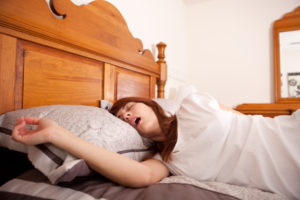 Many of our patients ask us about excessive drooling. While everyone experiences drooling from time to time, usually during sleep, those patients who struggle with salivary over production may have difficulty speaking clearly, eating certain foods, or smiling with confidence. If you’re dealing with excessive drooling, read this post to learn more about the causes of drooling and treatments available. If you want to find out more, talk to your skilled dentist during a preventive dentistry appointment.
Many of our patients ask us about excessive drooling. While everyone experiences drooling from time to time, usually during sleep, those patients who struggle with salivary over production may have difficulty speaking clearly, eating certain foods, or smiling with confidence. If you’re dealing with excessive drooling, read this post to learn more about the causes of drooling and treatments available. If you want to find out more, talk to your skilled dentist during a preventive dentistry appointment.
Common Causes of Drooling
Before we can offer effective treatment, we need to partner with you to determine the underlying causes of your excessive saliva production and drooling. Some of the most common causes of drooling include:
- Parkinson’s disease, Bell’s palsy, and other health concerns that impact muscle control
- Guillain-Barre Syndrome and other disorders that adversely impact the nerve system
- Epiglottitis and other oral infections that impede the ability to swallow
- Sinus and allergy issues
- Hormonal imbalances that may lead to the over or under production of saliva
- Traumatic brain injury
- Stroke
Treatments for Drooling
If you’re drooling during the day, this may be a sign of a more serious health concern that needs to be addressed in conjunction with medical professionals. For those patients struggling with nighttime drooling, there are a number of conservative treatments you can attempt to reduce saliva production during sleep, including:
- Change the position you sleep in. Side and stomach sleepers are much more likely to drool than those who sleep on their backs. Changing your sleep position and using a wedge pillow to elevate your head can reduce drooling.
- If you are suffering from allergies or sinus infection, taking medication or receiving other treatments to deal with these concerns can reduce nighttime drooling and allow you to sleep and breathe deeply.
- Patients diagnosed with obstructive sleep apnea may also struggle with drooling in their sleep due to difficulty swallowing. Consistently receiving treatment for sleep apnea can reduce drooling for these patients.
Meet the Dental Group West Team
At Dental Group West in Toledo, we offer patients a wide range of treatment options, including preventive, restorative, and cosmetic dentistry services in a comfortable and modern dental office. If you’re struggling with salivary over production, we may be able to help you. Please don’t hesitate to let us know during your next six month dental exam, or you can call our team anytime. In most cases, we’ll need to work with your medical doctor as well since the underlying causes of these concerns are often medical.
